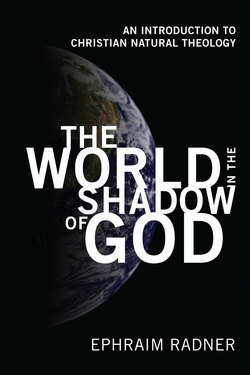The World in the Shadow of God

Реклама. ООО «ЛитРес», ИНН: 7719571260.
Оглавление
Ephraim Radner. The World in the Shadow of God
The World in the Shadow of God
1. I
2. Believe
3. In
4. God
5. The Father
6. Almighty
7. Creator
8. Of Heaven
9. And Earth
10. I Believe In
11. Jesus Christ
12. His
13. Only Son
14. Our Lord
15. He Was Conceived
16. By
17. The Power
18. Of the Holy Spirit
19. Born
20. Of the Virgin Mary
21. Suffered
22. Under
23. Pontius Pilate
24. Was Crucified
25. Died
26. And Was
27. Buried
28. He Descended
29. To the Dead
30. On
31. The Third Day
32. He Rose
33. Again
34. He Ascended
35. Into Heaven
36. And Is Seated
37. At
38. The Right Hand of the Father
39. He Will Come Again
40. To Judge
41. The Living
42. And the Dead
43. I Believe In
44. The Holy Spirit
45. The Holy
46. Catholic
47. Church
48. The Communion
49. Of Saints
50. The Forgiveness
51. Of Sins
52. The Resurrection
53. Of the Body
54. And
55. The Life
56. Everlasting
57. Amen
Отрывок из книги
An Introduction to Christian Natural Theology
•
.....
Not everyone who has objected to natural theology in our day on these grounds—not even, perhaps Barth himself, ultimately—would necessarily wish to undercut the possibility of knowing God through the world that God has made. But the construal of that world’s theologically descriptive capacity has been profoundly altered by the suspicion now almost universally cast upon natural theology’s modern argument with sacra doctrina. Stanley Hauerwas, while building on Barth’s classic articulation of that suspicion, has for instance, sought some kind of descriptively based theological indicator within the phenomenologically rooted “witness” of Christian service in the world. Such witness, he claims, through its very coherence with God’s will in Christ, attests to the “way things really are.” This is a kind of adjustment towards that which he has earlier precluded, as Hauerwas himself admits when he speaks, following Barth, of a “recovery of natural theology as a Christological theme.”12 But it may go further even than he realizes. For if Hauerwas is right, and proper Christian witness provides a rational response to, and language to talk about, God’s self-revelation, then it becomes possible to recover the value of much of the human-centered discussion that provided the modernist project that seemed to render purposefully inadequate the world’s indication of God: will not the Christian life, in its depth of integrity, finally permit coherence to emerge, however odd such coherence might seem to those whose eyes are still not used to the light?
The issue here has to do with the contours of the perceived world—both its own outlines, as it were (assuming they exist in and of themselves somehow), and the powers of perception belonging to those who apprehend it. Just as pertinently, then, there has been, in the wake of Barth’s writing in particular, a desire to grapple with the very character of creation in its intrinsic and intrinsically ordered relationship to God, just because of the Christian claim that any truly “natural theology,” in its original sense, must be bound up with the metaphysics of God’s own self-revealing. In other words, the “rupture” between nature and revelation that seems to have overwhelmed natural theology in the modern era is perhaps itself wrongheaded and in need of reconceiving.
.....